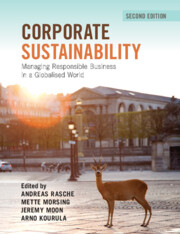41 results
Subject Index
-
- Book:
- Corporate Sustainability
- Published online:
- 09 March 2023
- Print publication:
- 30 March 2023, pp 625-638
-
- Chapter
- Export citation
Part IV - Corporate Sustainability: Issues
-
- Book:
- Corporate Sustainability
- Published online:
- 09 March 2023
- Print publication:
- 30 March 2023, pp 433-557
-
- Chapter
- Export citation
Part I - Corporate Sustainability: Approaches
-
- Book:
- Corporate Sustainability
- Published online:
- 09 March 2023
- Print publication:
- 30 March 2023, pp 27-152
-
- Chapter
- Export citation
Acknowledgements
-
- Book:
- Corporate Sustainability
- Published online:
- 09 March 2023
- Print publication:
- 30 March 2023, pp xxiv-xxiv
-
- Chapter
- Export citation
Boxes
-
- Book:
- Corporate Sustainability
- Published online:
- 09 March 2023
- Print publication:
- 30 March 2023, pp xii-xiii
-
- Chapter
- Export citation
Contents
-
- Book:
- Corporate Sustainability
- Published online:
- 09 March 2023
- Print publication:
- 30 March 2023, pp v-vii
-
- Chapter
- Export citation
Name Index
-
- Book:
- Corporate Sustainability
- Published online:
- 09 March 2023
- Print publication:
- 30 March 2023, pp 620-624
-
- Chapter
- Export citation
Figures
-
- Book:
- Corporate Sustainability
- Published online:
- 09 March 2023
- Print publication:
- 30 March 2023, pp viii-ix
-
- Chapter
- Export citation
Contributors
-
- Book:
- Corporate Sustainability
- Published online:
- 09 March 2023
- Print publication:
- 30 March 2023, pp xiv-xx
-
- Chapter
- Export citation
8 - Multinationals, Small and Medium-Sized Enterprises and Sustainability
- from Part II - Corporate Sustainability: Actors
-
-
- Book:
- Corporate Sustainability
- Published online:
- 09 March 2023
- Print publication:
- 30 March 2023, pp 155-169
-
- Chapter
- Export citation
Copyright page
-
- Book:
- Corporate Sustainability
- Published online:
- 09 March 2023
- Print publication:
- 30 March 2023, pp iv-iv
-
- Chapter
- Export citation
1 - Corporate Sustainability – What It Is and Why It Matters
-
-
- Book:
- Corporate Sustainability
- Published online:
- 09 March 2023
- Print publication:
- 30 March 2023, pp 1-26
-
- Chapter
- Export citation
Abbreviations
-
- Book:
- Corporate Sustainability
- Published online:
- 09 March 2023
- Print publication:
- 30 March 2023, pp xxv-xxviii
-
- Chapter
- Export citation
References
-
- Book:
- Corporate Sustainability
- Published online:
- 09 March 2023
- Print publication:
- 30 March 2023, pp 558-619
-
- Chapter
- Export citation
Preface
-
- Book:
- Corporate Sustainability
- Published online:
- 09 March 2023
- Print publication:
- 30 March 2023, pp xxi-xxiii
-
- Chapter
- Export citation
Tables
-
- Book:
- Corporate Sustainability
- Published online:
- 09 March 2023
- Print publication:
- 30 March 2023, pp x-xi
-
- Chapter
- Export citation
26 - Corporate Sustainability: Where Are We Going?
- from Part IV - Corporate Sustainability: Issues
-
-
- Book:
- Corporate Sustainability
- Published online:
- 09 March 2023
- Print publication:
- 30 March 2023, pp 550-557
-
- Chapter
- Export citation
Part III - Corporate Sustainability: Processes
-
- Book:
- Corporate Sustainability
- Published online:
- 09 March 2023
- Print publication:
- 30 March 2023, pp 295-432
-
- Chapter
- Export citation
Part II - Corporate Sustainability: Actors
-
- Book:
- Corporate Sustainability
- Published online:
- 09 March 2023
- Print publication:
- 30 March 2023, pp 153-294
-
- Chapter
- Export citation

Corporate Sustainability
- Managing Responsible Business in a Globalised World
-
- Published online:
- 09 March 2023
- Print publication:
- 30 March 2023
-
- Textbook
- Export citation



